The best puzzle games for Android
Our favorite Android logic tests, path-finding games, match puzzlers and brain-teasers.
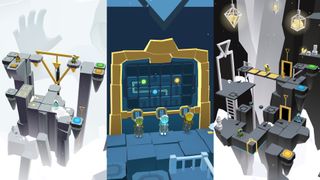
Path of Giants ($3.99/£3.49/AU$5.99)
Path of Giants is a path-finding puzzler with a decidedly minimalist vibe. This Android game features a trio of explorers, finding their way through icy caverns with sheer sides and terrifying drops. For some reason, the explorers also brought with them precisely no equipment, bar some really warm coats.
To get to higher levels, one explorer must clamber on top of another. Along with cunning use of landscape-moving switches and other contraptions, this technique enables them to make their way to the flying, colored goal squares that whisk them away to the next challenge.
Seasoned puzzlers probably won’t be tested too much, but the experience is nonetheless engaging and rewarding, combining elements of Android favorites Monument Valley and Lara Croft GO into a tasty frozen treat.
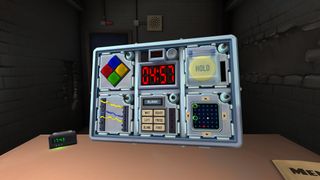
Keep Talking and Nobody Explodes ($9.99/£9.99/AU$12.99)
Keep Talking and Nobody Explodes pits you against a bomb designed by someone who’s watched one too many Hollywood movies featuring an over-the-top evil genius. The case is packed with modules, with anything from traditional wires to cut through to full games of Simon. Naturally, there’s also a massive LED countdown timer, because bomb-makers in games and on TV just love those.
The ‘making sure nobody explodes’ bit of this Android game requires help from one or more friends armed with the instructions (PDF or print-out) for defusing the contraption. If you’re playing properly, you can’t see the manual, and they can’t see the screen. This leads to a Spaceteam-style cacophony as you try to explain the cryptic switches and buttons before you, and they attempt to relay how to disable everything. Top stuff – and even more so when you head into VR using Daydream.
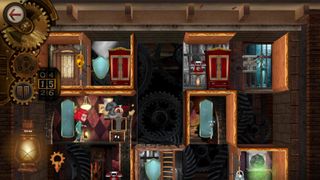
Rooms: The Toymaker's Mansion ($4.99/£4.69/AU$7.99)
Rooms: The Toymaker's Mansion finds a young girl locked inside a mansion designed by a crazed toymaker. The entire building is a gigantic clockwork contraption, its rooms split into pieces that slide back and forth. Your goal in each room is to find a key and make for the exit.
There’s a masterful elegance about the controls – a tap does everything from moving the piece of room you’re in, to activating special abilities. The puzzles are similarly tightly designed, and each can be completed in a small number of moves.
However, there’s flexibility to allow for experimentation – and even brute-forcing a solution when you get a bit stuck. Coupled with great visuals, Rooms proves an excellent spin on the old sliding puzzle formula, bringing it bang up to date for mobile play.
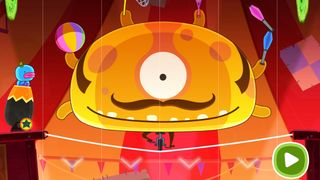
Bring You Home ($3.49/£3.19/AU$5.49)
Bring You Home is a puzzler with an entire series of classic cartoons at its core. It features accident-prone blue alien Polo and his pet. Said pet is swiftly kidnapped by mysterious hooded types who leap through a portal, so our hero sets off in hot pursuit, trips out of a window, and falls to the ground in deadly fashion.
Fortunately, the world can be endlessly rewound, and events shifted and changed by dragging and rearranging sliding panels that depict different objects. In the first scene, swapping out barrels for a trailer of hay saves Polo’s life and pride – but things get far more complicated later on.
There’s trial and error here, and logic sometimes takes a holiday. But given the superb animation, even failure is fun – to the point you’ll want Polo to mess up several times before you hit upon a solution.

SiNKR 2 ($1.99/£1.59/AU$2.79)
At its core, SiNKR2 is a puzzler about hooking shapes and dragging them to a goal. At first, this is almost absurdly simple – select a hook, and hold its switch to reel in the shape.
However, SiNKR 2 is a resolutely single-screen game, and this limitation means that the level designs shift from simple to devious – but at a pace so slow you barely notice it. Although it’s unlikely any one puzzle will stump you for hours, when you’re faced with many overlapping pathways, along with portals and other complications, you must think ahead to succeed.
Ultimately, SiNKR 2 may feel a little one-note for its duration, but that doesn’t really detract from what proves to be a sleek, solid, confident puzzler that knows precisely what it’s trying to be.
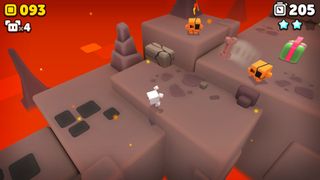
Suzy Cube ($3.99/£3.49/AU$5.49)
Suzy Cube is a platform game, but instead of offering the classic Mario side-on viewpoint enjoyed by everything from leapy one-thumb effort Canabalt to lush console-style classic Oddmar, Suzy Cube has you mostly bounding about in 3D.
It’s not dissimilar to Super Mario 3D Land, with the viewpoint switching as you explore chunky islands, watch from behind as you slide down snowy mountains on your bottom, flip between ‘2.5D’ passages in labyrinthine pyramids, or navigate floating platforms from above.
The controls are solid, and the variety of play styles works well, regularly shaking things up; yet there’s plenty of familiar territory to hook in dedicated platform fans. You’re still looking for an exit, grabbing coins, and jumping on enemy heads – only, as is rare on Android, in 3D.
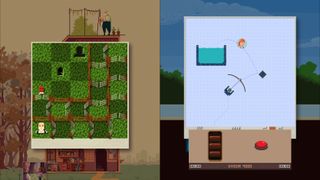
Photographs - Puzzle Stories ($3.99/£3.99/AU$5.99)
Photographs - Puzzle Stories is a puzzle game about consequences far beyond making the right move in a logic test. Here, a series of five narratives provides the framework for dozens of small puzzles – and while the game punches your brain, it gradually breaks your heart.
This is unusual stuff for a puzzler, but it provides Photographs with added gravitas, and elevates it beyond being yet another ‘mere’ puzzler, despite the familiar nature of its mechanics (aiming/sliding/matching/finding).
It all feels pretty special – more than the sum of its parts. That said, by the time you’ve worked through the first two stories, reached the third, and read “we greeted the settlers with open arms,” you don’t need to have a handle on history to know the ending is going to be tragic.
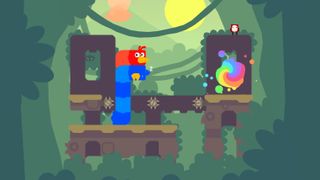
Snakebird Primer ($7.99/£5.99/AU$10.99)
Snakebird Primer features a bunch of snake-like birds, keen to reach a portal. The tiny snag is they live on tiny floating islands peppered with fruit and spikes. Hit a spike and your bird explodes. Wolf down some fruit and it grows – just like in dusty mobile classic Snake – which, depending on the level you’re playing, may help or hinder.
Old hands might recognize this game as the follow-up to the superb Snakebird (free + $4.71/£3.69/AU$6.44) – although, in reality, it’s more like a less brain-smashing version of that game, designed for mere mortals. This one’s puzzles are simpler, and far less likely to leave you a sobbing wreck in the corner.
Great for kids and casual gamers, then. That said, even though puzzle veterans might blaze through Primer, they’ll still have a blast doing so.
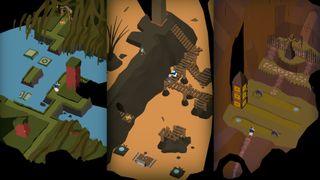
Where Shadows Slumber ($4.99/£4.59/AU$7.49)
Where Shadows Slumber pulls no punches – and that’s literally the case for the protagonist, who early on finds himself horribly assaulted by nasty bipedal animal creatures who want his lamp. It’s a surprising event – not least given that you might initially assume this will be a sedate puzzler along the lines of Monument Valley.
Between the cutscenes, Where Shadows Slumber dials down the unease and engages your brain. You must figure out pathways to exits, often forging them by casting shadows that refashion the very landscape. It’s a clever conceit, and one that never really grows old. Nor does the game’s visual clout, sense of pacing, and ability to surprise with its mix of beauty and darkness.
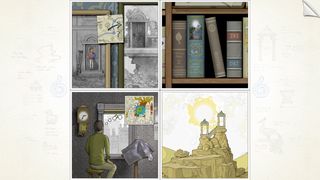
Gorogoa ($4.99/£3.79/AU$6.49)
Gorogoa is a puzzler designed to break your mind. It takes the form of a beautifully illustrated animated picture book, with individual panels telling some sort of story – and yet they don’t appear to be obviously related at a glance.
You must find links between everything to literally move the protagonist through the narrative. Early on, this might just require rearranging some panels, but as you head deeper into the game, you end up laying panels over others, or zooming into and out of scenes.
To say it’s perplexing is putting it mildly. Gorogoa is also frequently deeply weird. Most importantly, though, it’s a marvel: a wonderfully realized, tactile, unique game that makes you feel absurdly smart when you crack its challenges.
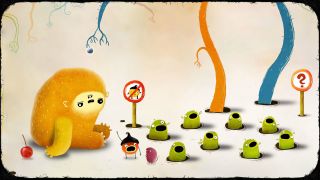
Chuchel ($4.99/£4.49/AU$6.99)
Chuchel is an exploratory puzzler that when played comes across like you’re watching a series of a distinctly weird cartoon. The titular protagonist, a ball of fluff, wants nothing more than to get a cherry – but it’s cruelly snatched away the second he gets near. Each single-screen challenge therefore tasks you with finding the convoluted route to Chuchel’s goal.
Packed with the heart, humor, and animated smarts evident in previous Amanita Design games, Chuchel is a joy to watch as you tap hot-spots, make decisions, and watch events play out.
Some canned animations are lengthy, and logic isn’t always prized, which means it can sometimes get tedious to trudge through a section until you nail the precise sequence to finish it. Still, this is more than offset by a game that frequently surprises and delights.
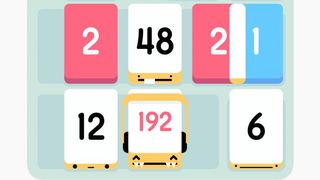
Threes! ($5.99/£5.49/AU$8.49)
The sort of silly maths game you might've played in your head before mobile phones emerged to absorb all our thought processes, Threes! really does take less than 30 seconds to learn.
You bash numbers about until they form multiples of three and disappear. That's it. There are stacks of free clones available, but if you won't spare the price of one massive bar of chocolate to pay for a lovely little game like this that'll amuse you for week, you're part of the problem and deserve to rot in a freemium hell where it costs 50p to do a wee.
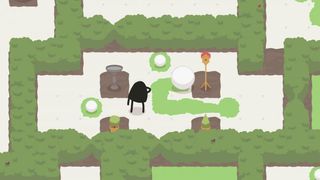
A Good Snowman ($4.99/£3.99/AU$6.99)
It turns out what makes a good snowman is three very precisely rolled balls of snow stacked on top of each other. And that's the core of this adorable puzzle game, which has more than a few hints of Towers of Hanoi and Sokoban about it as your little monster goes about building icy friends to hug.
What sets A Good Snowman apart from its many puzzle-game contemporaries on Android is a truly premium nature. You feel that the developer went to great efforts to polish every aspect of the production, from the wonderful animation to puzzles that grow in complexity and deviousness, without you really noticing — until you get stuck on a particularly ferocious one several hours in.

Shadowmatic (free + $2.99/£2.99/AU$3.99 IAP)
That game where you cast a shadow on the wall and attempt to make a vaguely recognizable rabbit? That’s Shadowmatic, only instead of your hands, you manipulate all kinds of levitating detritus, spinning and twisting things until you abruptly – and magically – fashion a silhouette resembling anything from a seahorse to an old-school telephone.
The game looks gorgeous, with stunning lighting effects and objects that look genuinely real as they dangle in the air. Mostly though, this is a game about tactility and contemplation – it begs to be explored, and to make use of your digits in a way virtual D-pads could never hope to compete with.

Hidden Folks ($3.49/£2.99/AU$6.49)
Hidden Folks is a hidden object game with a soul. It’s reminiscent of those mass-produced posters where you scour a massive, cluttered scene, trying to find the one person with a silly hat. The difference is that everything here has been made with love and care, from the hand-drawn interactive illustrations to the amusing oral sound effects.
The basics are admittedly much as you’d expect: scour the screen to find specific objects or characters, and move on when complete.
We realize that might not sound like much, but there’s a charm and humor to Hidden Folks that sets it apart from any of its contemporaries. On a larger Android phone or a tablet, this is a particularly relaxing, absorbing game to lose yourself in for a few hours.
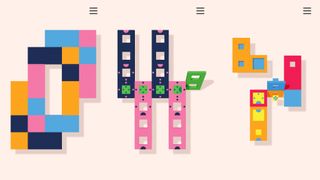
Dissembler ($2.99/£2.99/AU$4.49)
Dissembler is a match-three game with a difference. Instead of presenting you with a wall of gems that’s replenished when you make matches, Dissembler levels are akin to modern art – abstract creations comprising colored tiles.
You still swap two elements to try and match three (or more), but here matches vanish. The idea is to end up with a blank canvas. At first, this is easy, but Dissembler soon serves up challenges where you end up isolating tiles unless you’re very careful.
This shifts the game more heavily into strategic puzzling territory – and it’s all the better for it. You’ll feel like the smartest person around on figuring out the precise sequence of moves to clear the later levels. And even when you’ve finished them all, there’s a daily puzzle and endless mode to keep you occupied.





Comments
Post a Comment